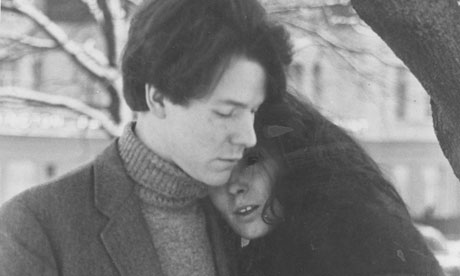
At the age of 22, Jonathan Barrow, a promising advertising copywriter, was killed in a car crash alongside his fiancee, Anita Fielding. It was a few days before the couple were due to get married. Both of them had been over the alcohol limit, though the police were never able to discern who was driving – something that, according to Jonathan's older brother, Andrew, the author of this unique and touching memoir, troubled their grieving father for several months after the event.
The couple's wedding was due to take place at the Brompton Oratory in London on 23 April 1970. Instead, it became a double requiem with the wedding guests now in the role of mourners. But what made Jonathan's death even more eerie was that he had left behind the manuscript of an unpublished novel, The Queue, in which a wedding turns unexpectedly into a funeral after a bride falls under the wheels of an oncoming bread van. "Tragic, early deaths, even double deaths, are alas not rare," writes Barrow, "but Jonathan's case is stranger than most."
For months afterwards, Barrow touted the manuscript around publishers to no avail. Instead, four decades on, he has written a tribute to his younger sibling that is part-biography, part-elegy, interspersed with extracts from Jonathan's own writing and reproductions of his comic sketches.
The result is a book unlike anything I have ever read. Barrow's reminiscences of his brother's life – from a Wiltshire childhood surrounded by eccentric relatives and a menagerie of animals (including a much-loved family dachshund) to a miserable time at Harrow and then on to a hand-to-mouth existence in late- 60s Chelsea – are touching and heartfelt. But in other places the book is overwhelmed by the anarchic, surrealist tone of Jonathan's own writing.
The Queue, from which Barrow quotes extensively and analyses with painstaking care, is darkly comic, treading a thin line between brilliance and total barminess. The heroine is a dachshund called Mary with human characteristics and a racy past. There are nightmarish visions of screw-on male genitalia, passages about homosexual pigeons and a detailed sequence in which a man is caught having sex with a hen. Beyond this, there seems to be very little narrative. Perhaps the whole thing is a surrealist masterpiece but it is hard not to concur with the opinion of Barrow's acquaintance Quentin Crisp who, after reading the manuscript, said: "Your brother looked healthy, happy, natural… But everything else about him is extremely odd. Not faintly odd. Extremely odd."
Barrow writes with obvious tenderness about his lost sibling – the youngest of five brothers – to whom he was very close. Despite, or maybe because of, his idiosyncrasies, Jonathan emerges from these pages as effervescent, clever and hilariously entertaining company but also as someone who did not invite intimacy and who never quite worked out who he was (Jonathan's unresolved sexuality and inner demons are occasionally hinted at but left unexamined).
The text is littered with private jokes which might or might not amuse others. The pop star Mike d'Abo, a Harrow contemporary who went on to become the lead singer of Manfred Mann, is something of a comic talisman for the Barrows who refer to him jokingly in conversations and letters. But d'Abo also makes frequent, inconsequential appearances in Animal Magic so that, in the middle of a paragraph about something else, d'Abo's chart success will suddenly be noted or he will be spotted on the street wearing "purple trousers and red shoes". It all adds to the impression that we are eavesdropping on something that should have remained private.
About two-thirds of the way through, there is a footnote in which Barrow relates that his friend, the comedian Barry Humphries, "reminded me recently that the best jokes are often understood by only one other person". It is hard not to feel that Animal Magic would have been best understood by the one person who, tragically, is no longer around to read it.

